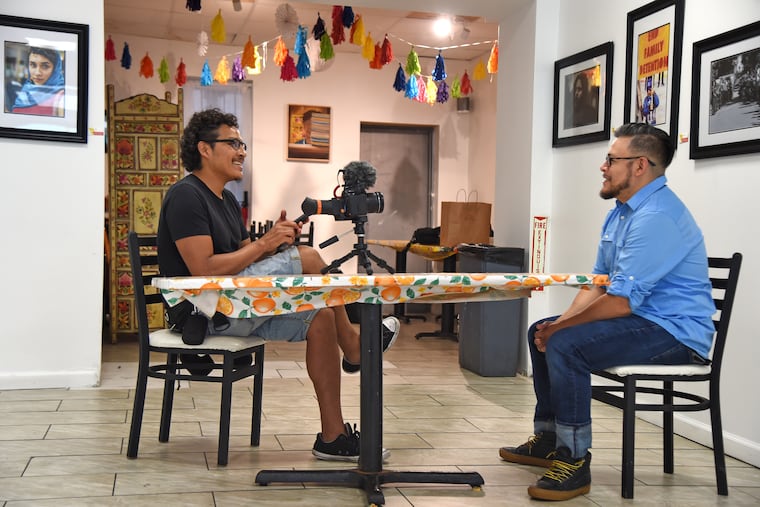Philly Latinos fear losing community media platform and visibility with new FCC order
“Spaces like PhillyCAM help communities produce stories that represent their own experiences.”

Producer Antonio Arroniz arrived 20 minutes early to shoot footage of the portraits hanging on the white walls at the restaurant South Philly Barbacoa’s event space. He was documenting the opening of the first solo exhibit for José Mazariegos, a photographer from Guatemala.
Arroniz, 44, doesn’t do this for a living. He works as a cook in a University City hotel restaurant and then volunteers as a producer to cover class differences within Philadelphia’s Mexican and Central American populations for PhillyCAM’s TV program Atrévete.
“This helps me tell other Latinos, and to people from African American and Asian communities, that not all Mexicans here are from Puebla,” Arroniz, a communications graduate from Mexico City, said of the Mexican state. “Speaking truly, we don’t know each other.”
As 10-year-old PhillyCAM, the city’s only community television station, stands to lose more than half its funding due to upcoming Federal Communications Commission changes, producers like Arroniz fear they will no longer have access to a platform that trains and equips an ecosystem of diverse communities.
Latinos produce five of its more than 90 TV products, including shows and segments, in which neighborhood issues and local community information are shared in multiple languages, including Aztecan Nahuatl. Atrévete is the station’s only in-house production by Latino staffers for Philly Latinos. Out of 600 PhillyCAM members — people who borrow equipment or train at its workshops — about 10% identify as Hispanic or Latino.
>> To read this story in Spanish, click here.
There is a concern that vulnerable communities will lose visibility if the station loses funding, and the democratization of cable media in Philadelphia would be threatened, said Clemencia Rodríguez, a professor for the department of media studies and production at Temple University.
“Spaces like PhillyCAM help communities produce stories that represent their own experiences,” she said, “something we lack of so much, since mainstream media doesn’t have people with these backgrounds to cover these topics in the same way or dimension.”
The FCC voted Aug. 1 to modify the 1984 Cable Communications Policy Act, which includes long-standing guidelines related to cable franchising fees that sustain public programming at places like PhillyCAM. Previously, cities could charge cable companies such as Comcast or Verizon for the use of local property, like sidewalks and utility poles, to operate the fiber optic cables. And local governments also received free access to channels for public, educational, and government (PEG) programming. Cities used some of the fees charged cable companies to support local PEG stations.
The FCC’s order now allows cable companies to assign market values to those services and charge that amount to local municipalities, potentially reducing cities’ monetary support for PEG outlets. In Philadelphia, there are five community media stations, and PhillyCAM, which also runs a three-year-old radio station, is the only PEG outlet of the five. (There are other kinds of PEG outlets, including universities and the Philadelphia School District.) The changes will take effect 30 days after the ruling’s publication in the Federal Register in September.
PhillyCAM’s executive director, Gretjen Clausing, said she hasn’t yet heard from city officials but knows they will have less money for public-access channels.
In the meantime, she said, PhillyCAM is using its 10th anniversary celebration to create an awareness campaign about what it provides the community.
Antoine Haywood, a Ph.D. student at the University of Pennsylvania’s Annenberg School for Communication, has been following the FCC’s order change as a public policy intern for the Alliance for Community Media. He believes the city of Philadelphia and its communities are at a “huge loss.”
“In Philadelphia, people want to see their neighbors, they want to follow City Council, community affairs, what’s happening at the local library, and community media gets to that,” said Haywood, who used to do community engagement at PhillyCAM. “But, there is a lack of public understanding of the issue.”
Gabriela Watson-Burkett is the Afro Latina who coordinates the production of PhillyCAM’s Atrévete. She explained that Latinx producers tend to be a mix of barbers, professors, street vendors, journalists, music artists, or servers who cover human and immigrant rights in Spanglish.
“This community is still seeking a voice, and they feel responsible for providing that to their families, followers, and neighbors,” she said.
Also, she added, bilingualism and multiculturalism — shows focus on “Latino-ness” as a whole, not singular groups such as Dominicans, Puerto Ricans, or Mexicans — are defining characteristics of the programs Latinos produce at PhillyCAM, something Rodríguez thought made the station a pioneer in Philadelphia. And Atrévete often acts as a springboard for producers to create their own TV or radio project.
Panamanian Odín Palacio has hosted the TV program Atrévete since it started in 2017. His work on the program, which is shown on Comcast’s Xfinity channels 66/966HD/967 and Verizon’s FIOS channels 29/30, led him to co-found Higher Than 7, one of six radio shows produced by Latinos on WPPM 106.5 FM. The show profiles community members whose talent goes “above and beyond.”
“I wanted to introduce myself as part of the Latino community, and I’ve met so many people, it’s scary to lose this place,” said Palacio, 35, who is better known as “Udini La Voz," the voice of Udini.
Emma Restrepo, 53, is a Colombian journalist who hosts Dos Puntos — which translates to colon, like the punctuation mark, in Spanish — a talk show that connects the U.S. Latinx with the experiences of Latinos in Latin America and Europe, and vice versa. When she worked as a broadcaster with the commercial radio station El Zol Philly, Restrepo saw the lack of “real journalism” in addressing community and neighborhood experiences as a serious issue.
“At PhillyCAM we can have a conversation with respect and dignity about the policies that affect the communities, while holding our politicians, nonprofits, and businesspeople accountable,” she said.